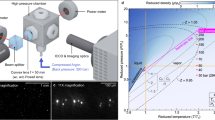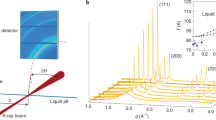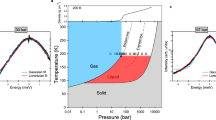Abstract
THE rare gases argon and krypton form a solid solution at 77° K. that shows a positive deviation from Raoult's law1. At this temperature, the tendency toward phase separation may be estimated from the value of the energy of mixing parameter w AB/kT of about 1.3. This value was estimated by the use of the crude treatment of regular solutions2 on data taken in an apparatus not primarily designed for the task.
This is a preview of subscription content, access via your institution
Access options
Subscribe to this journal
Receive 51 print issues and online access
$199.00 per year
only $3.90 per issue
Buy this article
- Purchase on Springer Link
- Instant access to full article PDF
Prices may be subject to local taxes which are calculated during checkout
Similar content being viewed by others
References
Singleton, J. H., and Halsey, G. D., J. Phys. Chem., 58, 330 (1954).
Fowler, R. H., and Guggenheim, E. A., “Statistical Thermodynamics”, para. 818 (Cambridge, 1939).
ibid., para. 819.
Author information
Authors and Affiliations
Rights and permissions
About this article
Cite this article
HALSEY, G., FREEMAN, M. Critical Temperature for Phase Separation of the Solid Solutions of Rare Gases. Nature 178, 431–432 (1956). https://doi.org/10.1038/178431b0
Issue Date:
DOI: https://doi.org/10.1038/178431b0
Comments
By submitting a comment you agree to abide by our Terms and Community Guidelines. If you find something abusive or that does not comply with our terms or guidelines please flag it as inappropriate.



